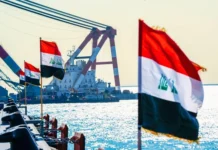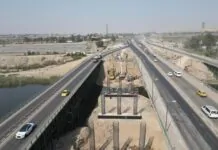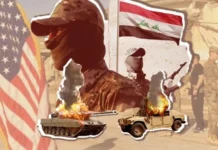Tishwash: Washington: We support Iraq’s economic reform agenda, updating the budget and enhancing transparency
The United States affirmed, today, Thursday, its commitment to supporting the economic reform agenda in Iraq, including updating the budget and enhancing transparency.
“I was pleased to meet with Finance Minister Taif Sami Mohammed,” said US Ambassador to Baghdad Alina Romanowski. “Economic diplomacy is a fundamental pillar of the comprehensive US-Iraq partnership.”
She added, “The US government is committed to supporting Iraq’s economic reform agenda, including updating the budget and enhancing transparency.” link
Tishwash: Al-Sudani: The government has regained the confidence of citizens
“There is no stopping in implementing projects and following up on them everywhere, and local governments are the second arm of the state after the ministries.” This is the approach that Prime Minister Mohammed Shia al-Sudani relied on, who confirmed that the important achievement that was made is that his government was able to restore the confidence of citizens, especially in the service aspect, pledging to continue this.
The Prime Minister visited Diyala Governorate yesterday, Wednesday, and opened the (Baghdad-Khalis Road) with a length of (60) km, round trip, and several other projects, while he announced a package of new projects.
Al-Sudani said during the visit: “Diyala represents a miniature Iraq with its national diversity and has made many sacrifices, and it is shameful to talk about infrastructure in the year (2024).” He explained that “following up on important projects through field visits to the governorates is an approach followed to determine the implementation rates and the most important problems and obstacles,” stressing “the commitment to the principle of working in the spirit of one team between the federal government and local governments, which are the second executive arm of the government after the ministries.”
The Prime Minister stressed that “the government has regained citizens’ confidence, which is an important achievement that must continue, especially in the service sector,” noting that “infrastructure projects are a priority for the government, and it is imperative to complete them, especially the stalled ones.” He also announced “the formation of a committee that will begin its work next week to follow up on the outcomes of his visit to Diyala Governorate, and submit recommendations related to it to the Council of Ministers.”
Al-Sudani directed the necessity of completing major service projects within their specified timeframes, appreciating the role of all workers in these projects that the government has placed among the priorities of its government program. link
*************
Tishwash: ILO: Iraqi government has developed programmes to help facilitate transition to formal economy
The International Labor Organization confirmed on Wednesday that the current government has developed programs and policies that help facilitate the transition to the formal economy, while indicating that informal work represents a crucial component despite its problems in economic activity.
The International Labor Organization’s country coordinator, Maha Kattaa, said at the national conference on informal work and paths towards decent work in Iraq, which was followed by “Al-Eqtisad News”, that “this conference addresses a very important and urgent issue, which is the issue of the informal economy and informal work,” noting that “the informal economy refers to the group of economic activities carried out by workers and economic units that are not covered either in law or in practice by formal arrangements or may be covered sufficiently.”
“Informal or irregular work is a complex, multifaceted phenomenon that includes a variety of activities, transactions and individuals who work outside formal businesses but sometimes also work within formal businesses,” she added, noting that “informal work represents a crucial but somewhat problematic component of economic activity while the informal sector can be a mechanism for addressing and alleviating poverty.”
She explained that “most of the poor work in the informal sector, so we should not look at this sector as unfair, but also as a sector that absorbs the poor and attracts individuals with low skills and low educational attainment. Therefore, the issue of looking at this sector is very important because it absorbs this number of workers.”
The sector explained that “the problem lies in crises and shocks when they occur in any country, including the recent crisis with Corona. Those who were affected more than the workers are the workers in the informal sector because there was no mechanism to reach these workers. On the contrary, the workers who work in the organized sector have records that show where these workers are located.”
She continued: “It was difficult to provide some services to workers in the informal sector, so we sometimes call them invisible workers, because it is really difficult to reach them, in addition to companies and institutions that operate in an informal manner, even in crises, there is a difficulty in how to reach these companies to help them in most countries, and during the Corona crisis, aid packages were provided to companies, but we did not reach companies and institutions if they were not regular.”
She pointed out that “informal work is not limited to Iraq, it exists all over the world, but the percentage of informal work or informal economy varies from one country to another,” indicating that “the International Labor Organization adopted in 2015 a recommendation called the recommendation for the transition from the informal economy to the formal economy, and recommendation number 204 approved guiding policies for all countries that wish to complete the transition process to help them in this process.”
She pointed out that “there can be flexibility to absorb shocks while enhancing the creation of decent job opportunities, and we must look at the Iraqi economy with the structure of the economy that relies heavily on oil and contributes significantly to exports, and that more than 90% of exports in Iraq come from oil, and the revenues that come from oil are what contribute to the government budget and also to the gross domestic product,” noting that “the oil sector does not employ large numbers, so we notice that the gross domestic product comes from the resource, and the labor comes from another source.”
She stated that “small, medium and large companies play a role in creating job opportunities in the construction, services and manufacturing sectors, which create job opportunities in Iraq,” explaining that “women work more in the informal sector in most countries of the world, while in our Arab region, men work more in the informal sector for several reasons, the most important of which is that women in our Arab region and also in Iraq prefer to work either in the public sector or in the organized private sector, as job opportunities in the informal sector do not attract women. This issue is attributed to the advantages offered by the informal private sector, because it is an unprotected sector that does not provide decent job opportunities or social security. There is no protection for workers, so women are reluctant to enter the labor market, especially in the sectors.”
“We commend the current government for taking major measures and procedures to facilitate the transition through new legislation, including the Social Security Law and the amendment of the Labor Law in 2015, all of which helped move forward with the transition process,” she added, “There are current material policies, plans and programs being implemented by the government, including the recently launched National Development Plan, work to update the private sector development strategy, the policy of regulating small projects and developing small and medium enterprises, and others. All of these programs and policies will also help facilitate the transition process.” link





